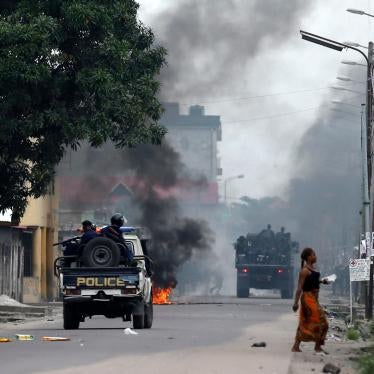The image of corpses piled up before the U.S. Embassy in Monrovia in July shocked Americans' conscience. Despite several thousand marines offshore, however, Washington has still not made a real commitment to solving Liberia's crisis.
If people knew more about how those Liberians on the embassy doorstep were killed, they might also understand how limited U.S. action has been so far, and what Washington still needs to do. Peacekeepers alone won't solve the problem.
The dead were civilians killed in indiscriminate rebel shelling in late July. Dozens of mortar rounds fell on a compound across from the U.S. Embassy, where thousands of civilians had taken shelter. Scores of civilians died and over 2,000 people were wounded by mortars and stray bullets in the attack.
Where did the rebels get the mortar rounds? In late June, troops from the Liberians United for Reconciliation and Democracy (LURD) ran out of ammunition and were forced to abandon an offensive in Monrovia. Three weeks later, resupplied with ammunition, including 81- and 82-millimeter mortar rounds, LURD attacked again. Their bombardment led to many of the casualties around the U.S. Embassy.
The LURD mortars very likely came through neighboring Guinea, a recipient of U.S. military aid. Human Rights Watch documented LURD's links to Guinea last year and called on Guinea and the United States to hold LURD accountable for its abusive conduct of war. This spring, a UN panel of experts, which had also linked Guinea and LURD, reported suspicions that flights into Guinea for a mining company carried weapons that were later transported to LURD by sea and land
Belatedly, the U.S. government called on Guinea to cease its support for the LURD. But Guinea has thus far evaded international condemnation for its record in fuelling the Liberian conflict.
Côte d'Ivoire has played a similar role arming the other Liberian rebel group, Movement for Democracy in Liberia (MODEL). Witnesses have told Human Rights Watch that the Ivoirian government recruited fighters for its own conflict with the promise that they could "keep their arms and take them back to Liberia to fight Taylor." Toulepleu, a town in the west of Côte d'Ivoire, has proved an ideal base for the Movement for Democracy to launch attacks into Liberia.
Charles Taylor's government in Liberia relied on help from across the border, too. The Liberian government is under UN sanctions, but counted on regional allies such as Burkina Faso to help cover up its illegal arms imports. Regular night flights to Monrovia's Robertsfield International Airport continued through early August.
The LURD and MODEL rebels profit from the regional and international antipathy to Charles Taylor, who fomented instability and human rights abuses across West Africa and earned an indictment on war crimes in Sierra Leone before being forced into exile in Nigeria last month. Taylor's militias regularly recruited children, tortured, raped and summarily executed civilians in Liberia.
The West African intervention has brought some stability to Monrovia, but the regional force remains too small to deploy outside the capital in significant numbers. Meanwhile, all three warring parties - the government militias, LURD and MODEL - have continued to rape, loot and displace civilians in the rural areas. This despite Taylor's departure and arrangements for an interim government to take power in Monrovia next month.
Liberia urgently needs more peacekeepers. But West Africa as a whole needs sustained and skillful diplomacy just as badly. The continuing war in Liberia is a regional war, and the United States has lost many opportunities to engage West African governments in ways that might have lessened the suffering this war has caused. The Bush administration should not lose any more chances.






